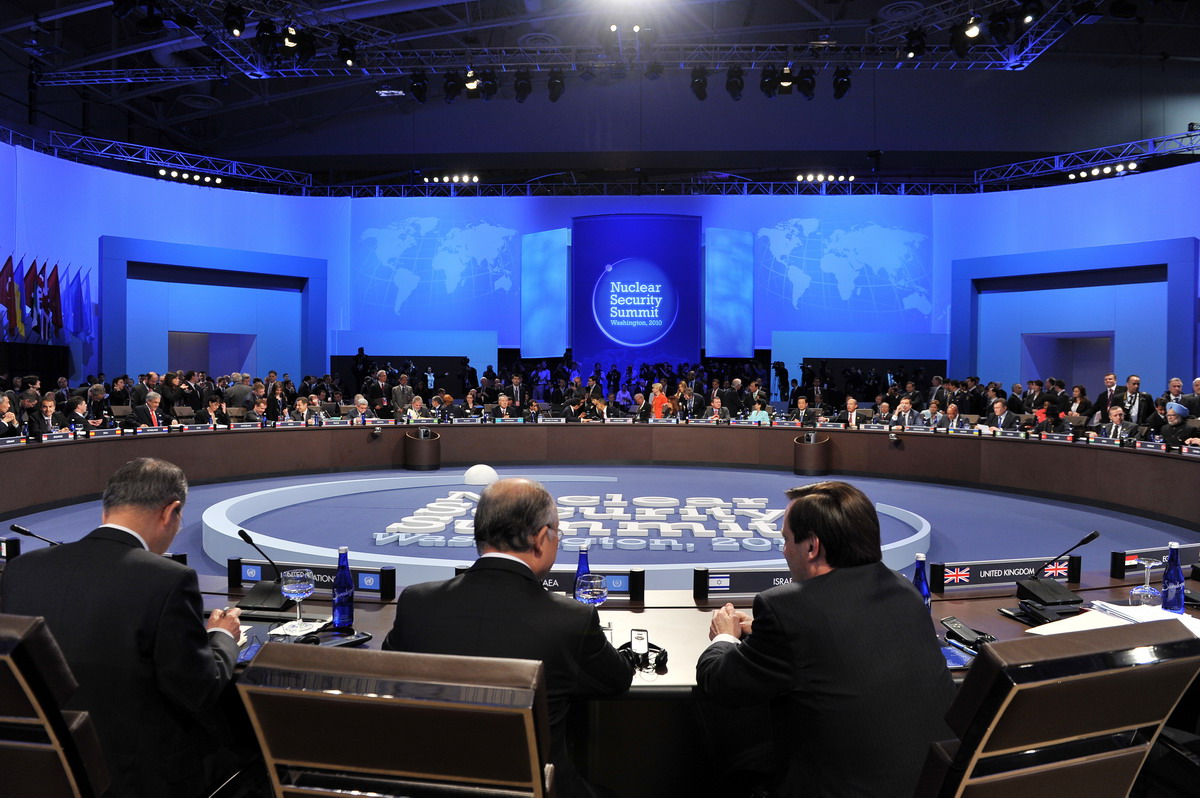With his “Summit for Democracy,” Joe Biden enthrones himself on the collapsed stage of American exceptionalism, writes Scott Ritter.
By Scott RITTER
Some campaign promises, it turns out, should not be kept. In a major foreign policy address delivered on July 11, 2020, then-candidate Joe Biden declared that, if elected,
“I will ensure that democracy is once more the watchword of U.S. foreign policy — not to launch some moral crusade, but because it is in our enlightened self-interest. We must restore our ability to rally the Free World — so we can once more make our stand upon new fields of action and together face new challenges.”
To this end, Biden promised that “We will organize and host in the United States, during the first year of my administration, a global Summit for Democracy to renew the spirit and shared purpose of the nations of the Free World.” This summit, Biden noted, would build off “the successful model we instituted during the Obama-Biden administration with the Nuclear Security Summit,” adding that those who attend this Summit for Democracy “must come prepared with concrete commitments to take on corruption, counter authoritarianism, and advance human rights in their own nations.”
On Thursday, Joe Biden will make good on this promise, convening a two-day virtual “Summit for Democracy”
“which will bring together leaders from government, civil society, and the private sector to set forth an affirmative agenda for democratic renewal and to tackle the greatest threats faced by democracies today through collective action.”
Many progressive voices otherwise sympathetic to Biden’s candidacy thought the idea of a Summit for Democracy was a bad idea.
David Adler and Stephen Wertheim, for example, went so far as to write an OpEd for The Guardian in December 2020 criticizing the summit as “at once too blunt and too thin an instrument,” noting that
“although the summit might serve as a useful forum for coordinating policy on such areas as financial oversight and election security, it is liable to drive U.S. foreign policy even further down a failed course that divides the world into hostile camps, prioritizing confrontation over cooperation.”
On this point, Adler and Werthheim have proved to be prescient. In March, Biden took the unusual step of publishing an Interim National Security Strategic Guidance “to convey my vision for how America will engage with the world.”
This document was intended to be a policy placeholder while Biden’s national security and foreign policy team finished the bureaucratic processes associated with promulgating a new, coordinated National Security Strategy to replace the one published by former President Donald Trump back in 2018.
Tool of Exceptionalism

New Orelans Mardis Gras float in the Krewe of King Arthur. (PxHere, CC0)
Biden latched on to “democracy” as a tool of American exceptionalism, the promotion of which would serve to rally like-minded nations into the American camp to oppose the forces of autocracy. The rejuvenation of the United States under Biden’s leadership, the interim strategy guidance stated,
“begins with the revitalization of our most fundamental advantage: our democracy. I believe we are in the midst of an historic and fundamental debate about the future direction of our world. There are those who argue that, given all the challenges we face, autocracy is the best way forward. And there are those who understand that democracy is essential to meeting all the challenges of our changing world.”
Democracy, Biden claimed, “holds the key to freedom, prosperity, peace, and dignity. We must now demonstrate — with a clarity that dispels any doubt — that democracy can still deliver for our people and for people around the world. We must prove that our model isn’t a relic of history; it’s the single best way to realize the promise of our future. And, if we work together with our democratic partners, with strength and confidence, we will meet every challenge and outpace every challenger.”
Stirring words, for sure, which, to an untrained ear, might very well inspire one to actually believe such lofty goals and objectives were both genuine and achievable. Sadly, on both counts, Biden and his Summit for Democracy fail. The reasons for this are many, but for the sake of brevity, will be encapsulated in the “golden rules” which should never be broken if a project like the Summit for Democracy is going to be undertaken.
Golden Rule No. 1: Pick a model of success that actually succeeded

The first Nuclear Security Summit on April 13, 2010. (Korean Culture and Information Service, CC BY-SA 2.0, Wikimedia Commons)
Biden and his team of advisers have modeled the Summit for Democracy on President Obama’s Nuclear Security Summit (NSS), the first of which was convened in 2010, and the last in 2016.
Like the Summit for Democracy, the NSS was an exclusive event, limited to 53 nations. Critics have pointed out that, regardless of the limited advances made regarding the issues surrounding nuclear security, when it came to the larger (and far more important) issue of nuclear non-proliferation, the exclusivity of the invitation process politicized what was otherwise a technical discussion, breaking the world down into “haves” and “have nots” when it comes to matters pertaining to peaceful nuclear activity.
This exclusivity proved to be the undoing of the NSS, with the narrow focus of the topic, combined with the limited invitation list, serving to kill the momentum generated during the first summit in just four years’ time.
The lack of a true multi-lateral composition resulted in the NSS failing to be able to extend its reach beyond 2016, the year of the last summit. Despite the limited gains made during the four summits, the fact remains that the world was a far more dangerous place in terms of nuclear proliferation in 2016 than it was in 2011, underscoring the reality that exclusive, ideologically aligned summits are not conducive to achieving broad-based global change.
Given the scope and scale of Biden’s ambitions for democracy, perhaps a different organizational model should have been embraced. But that could only happen if Biden were truly interested in change. The fact is, Biden is seeking to replicate the atmosphere of optimism and hope that defined the Obama administration in its first years. The mirror imaging of the NSS model by the Summit for Democracy only underscores the importance of process over substance in the Biden administration. Perception, not reality, is the name of the game.
Golden Rule No.2: Be consistent about what’s being promoted.
In his July 2020 address on foreign policy, then-candidate Biden highlighted what he termed one of the great successes of the Obama administration when it came to promoting democracy abroad.
“Take, for example, the nations of El Salvador, Guatemala and Honduras. As vice president, I secured commitments from the leaders of El Salvador, Guatemala and Honduras to take on the corruption, violence, and endemic poverty in their countries that are driving people to leave their homes. Then I worked with a Republican Congress to approve a $750 million aid package to help support those reforms. And guess what — it worked.”
It worked so well that neither El Salvador, Guatemala nor Honduras are being invited to the Summit for Democracy.

U.S. President Joe Biden, left, with adviser Juan S. Gonzalez, at right. (Twitter)
As Juan Gonzalez, the White House lead for U.S. policy towards Latin America, explained in a recent interview, “we would have loved to have the countries of Guatemala, Honduras and El Salvador at the democracy summit.”
However, Gozalez explained, “we don’t think that El Salvador is — is perhaps either ready or will contribute productively to the conversation that we’re going to have.” Gonzalez then proceeded to provide a laundry list of reasons, including El Salvador’s “refusing to take action on corruption,” to justify its exclusion.
The same argument was made regarding Guatemala. “[W]e are very concerned about widespread corruption in Guatemala and one where judicial institutions are facilitating or even protecting it,” Gonzalez said. Likewise on Honduras, which Gonzales recognized “as a democracy and a longstanding partner,” before declaring that “we had some serious concerns about matters that have been unaddressed on corruption.”
In short, the nations that Biden singled out as representing foreign policy success under the Obama-Biden administration are now being excluded from the very forum in which such successes should be highlighted.
The problem, however, is that the Obama-Biden policies failed to achieve the results Biden claimed had been accomplished. And the price these three Latin American countries are paying is to be excluded from a summit which ostensibly promotes the very democratic values the U.S. is trying to facilitate in these nations.
One thing is for certain — by denying El Salvador, Guatemala and Honduras a seat at the table of democracy, Biden will only further entrench the very forces he is seeking to address by holding the summit in the first place.
And, as a corollary to this rule, don’t invite C.I.A.-sponsored opposition figures whose most recent contribution to governance is a series of failed coup attempts. By extending an invitation to Juan Guido to attend the Summit for Democracy, Joe Biden is making a mockery of the very principles he claims to be promoting.
Golden Rule No. 3: When selling democracy, get your own house in order first

Storming of the U.S. Capitol on Jan. 6. (TapTheForwardAssist/Wikimedia Commons)
This one is basic. In selling democracy as a concept worthy of emulation, Biden, in his interim national security guidance, declared that “we will demonstrate not only that democracies can still deliver for our people, but that democracy is essential to meeting the challenges of our time.” This was going to be an uphill struggle, Biden noted.
“[D]emocracies across the globe, including our own, are increasingly under siege. Free societies have been challenged from within by corruption, inequality, polarization, populism, and illiberal threats to the rule of law.”
Biden declared that under his leadership, the United States would “lead by the power of our example,” adding that this would require
“hard work at home — to fortify the founding pillars of our democracy, to truly address systemic racism and to live up to our promise as a nation of immigrants. Our success will be a beacon to other democracies, whose freedom is intertwined with our own security, prosperity, and way of life.”
Rare, however, is the successful salesman who seeks to peddle a product still under development. This task is made even more difficult if the product being pitched has undergone recent catastrophic failure which has yet to be repaired. American democracy is broken, and it remains to be seen as to whether it can be fixed. The events of Jan. 6, 2021, cannot be viewed as a one-off anomaly, but rather as a symptom of a larger disease of partisan divide that has caused many Americans to lose faith in the very institutions which serve as the foundation of what passes for democracy today.
By convening the Summit for Democracy, Biden is engaging in a very public theatrical event, a show which has him seated at the head of the table, like King Arthur, inviting lesser democratic partners to join him so that he can begin the process of confronting the forces of autocracy which have taken root in the world today.
A king, however, should be believable when he opines on issues, especially those that define his kingdom and the nature of his rule. Biden is not believable when it comes to matters pertaining to democracy.
The American model of democratic rule is no longer worthy of emulation, and America has long lost the ability to export this failed model from the tip of a bayonet. Simply convening a gathering, and placing yourself at its head, does not in and of itself imbue one with legitimacy or authority. In the immortal words of Tywin Lannister, “Any man who must say, ‘I am the king,’ is no true king.”
Joe Biden is no true king, especially when it comes to the issue of democracy.








